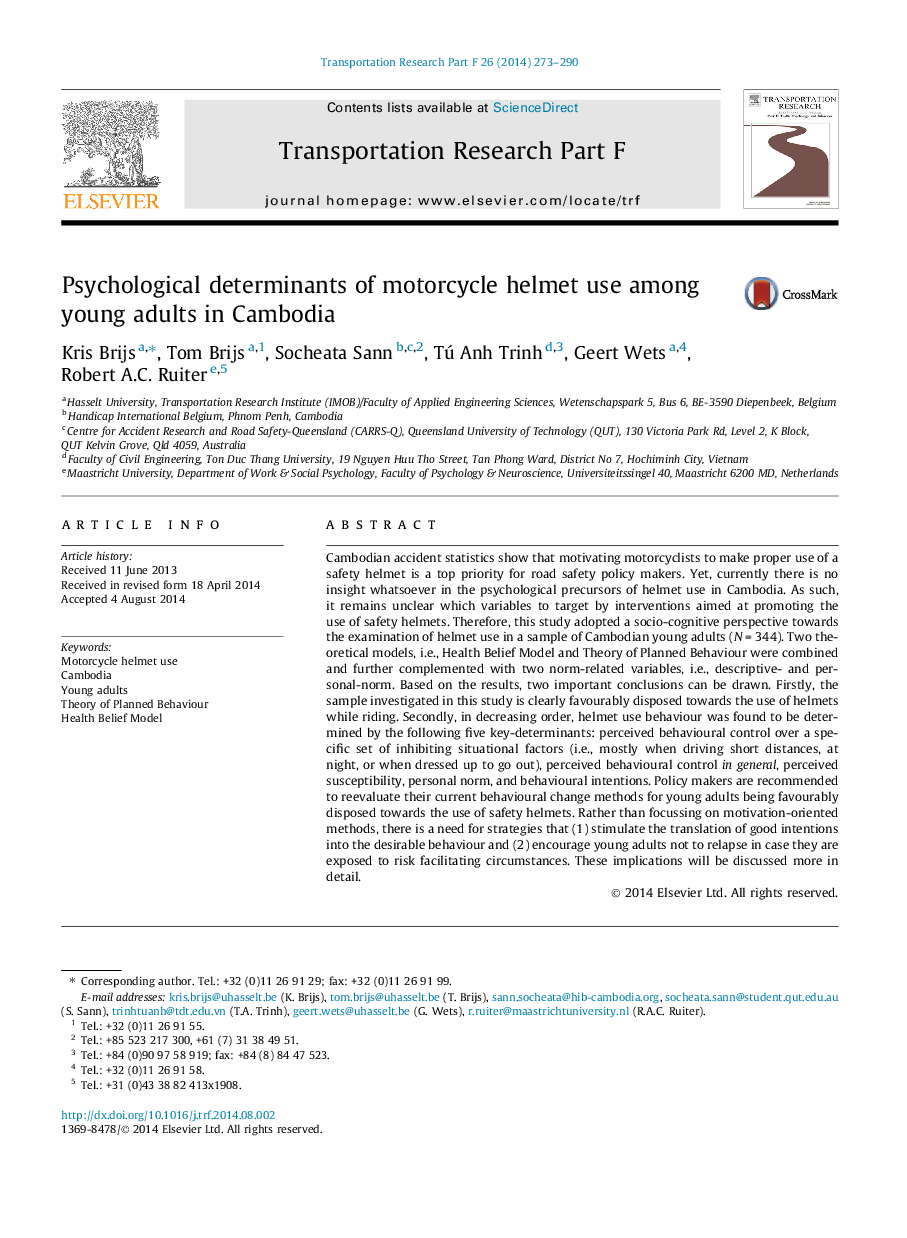| کد مقاله | کد نشریه | سال انتشار | مقاله انگلیسی | نسخه تمام متن |
|---|---|---|---|---|
| 10442974 | 915195 | 2014 | 18 صفحه PDF | دانلود رایگان |
عنوان انگلیسی مقاله ISI
Psychological determinants of motorcycle helmet use among young adults in Cambodia
ترجمه فارسی عنوان
تعیین عوامل روانشناختی کلاه ایمنی در میان بزرگسالان جوان در کامبوج
دانلود مقاله + سفارش ترجمه
دانلود مقاله ISI انگلیسی
رایگان برای ایرانیان
کلمات کلیدی
استفاده از کلاه ایمنی موتورسیکلت، کامبوج، جوانان، نظریه رفتار برنامه ریزی شده، مدل اعتقاد بهداشتی
موضوعات مرتبط
علوم انسانی و اجتماعی
روانشناسی
روان شناسی کاربردی
چکیده انگلیسی
Cambodian accident statistics show that motivating motorcyclists to make proper use of a safety helmet is a top priority for road safety policy makers. Yet, currently there is no insight whatsoever in the psychological precursors of helmet use in Cambodia. As such, it remains unclear which variables to target by interventions aimed at promoting the use of safety helmets. Therefore, this study adopted a socio-cognitive perspective towards the examination of helmet use in a sample of Cambodian young adults (NÂ =Â 344). Two theoretical models, i.e., Health Belief Model and Theory of Planned Behaviour were combined and further complemented with two norm-related variables, i.e., descriptive- and personal-norm. Based on the results, two important conclusions can be drawn. Firstly, the sample investigated in this study is clearly favourably disposed towards the use of helmets while riding. Secondly, in decreasing order, helmet use behaviour was found to be determined by the following five key-determinants: perceived behavioural control over a specific set of inhibiting situational factors (i.e., mostly when driving short distances, at night, or when dressed up to go out), perceived behavioural control in general, perceived susceptibility, personal norm, and behavioural intentions. Policy makers are recommended to reevaluate their current behavioural change methods for young adults being favourably disposed towards the use of safety helmets. Rather than focussing on motivation-oriented methods, there is a need for strategies that (1) stimulate the translation of good intentions into the desirable behaviour and (2) encourage young adults not to relapse in case they are exposed to risk facilitating circumstances. These implications will be discussed more in detail.
ناشر
Database: Elsevier - ScienceDirect (ساینس دایرکت)
Journal: Transportation Research Part F: Traffic Psychology and Behaviour - Volume 26, Part A, September 2014, Pages 273-290
Journal: Transportation Research Part F: Traffic Psychology and Behaviour - Volume 26, Part A, September 2014, Pages 273-290
نویسندگان
Kris Brijs, Tom Brijs, Socheata Sann, Tú Anh Trinh, Geert Wets, Robert A.C. Ruiter,
